BSc Health and Social Care: Dementia's Effects on London Residents
VerifiedAdded on 2023/01/05
|44
|13023
|1
Project
AI Summary
This research project, conducted for a BSc in Health and Social Care, investigates the behavioral and psychological effects of dementia on individuals living with the condition, specifically focusing on the population in London. The study begins with an introduction to the global prevalence of dementia, its causes, and the increasing number of cases in the UK. The project's objectives include exploring behavioral and psychological effects and assessing the emotional and social impact. The methodology involves a literature review using secondary data from research papers, books, and official reports, analyzed through content analysis. The findings reveal behavioral effects such as agitation and psychological effects like depression. The project concludes with recommendations for improved caregiver support, policy changes, and further research, emphasizing the need for increased awareness and sensitization programs to reduce the impact of dementia on individuals and the healthcare system.
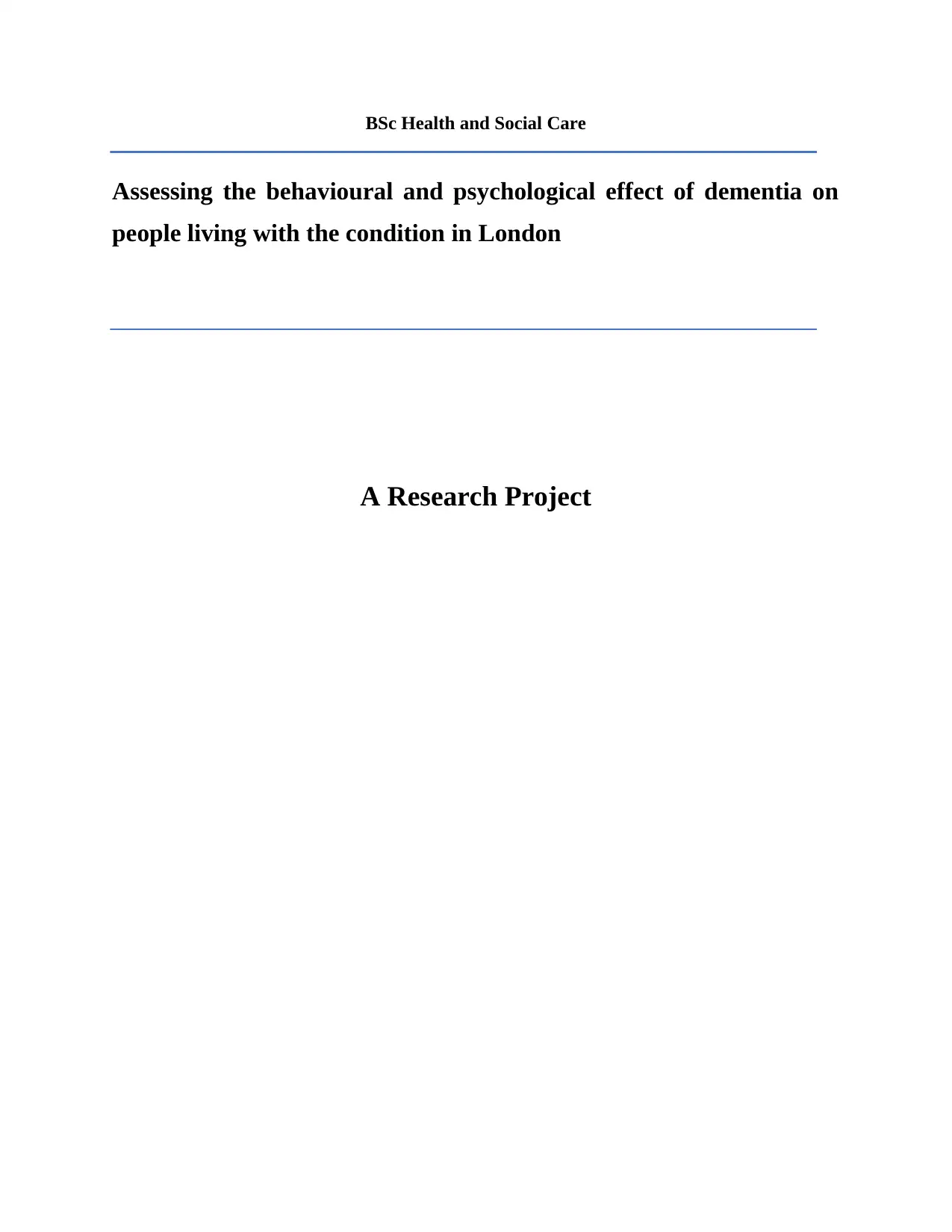
BSc Health and Social Care
Assessing the behavioural and psychological effect of dementia on
people living with the condition in London
A Research Project
Assessing the behavioural and psychological effect of dementia on
people living with the condition in London
A Research Project
Paraphrase This Document
Need a fresh take? Get an instant paraphrase of this document with our AI Paraphraser

Table of Contents
ABSTRACT....................................................................................................................................1
1.0 Introduction to the chapter.....................................................................................................3
1.1 Background of the study........................................................................................................3
1.2 Aim and objectives of the study............................................................................................6
1. Specific Objectives are to:.......................................................................................................6
1.4 Rationale for the study...........................................................................................................6
1.5 Significance of the study.......................................................................................................6
1.6 Summary of the chapter.........................................................................................................7
CHAPTER TWO - LITERATURE REVIEW................................................................................8
2.1 Introduction............................................................................................................................8
2.2 Overview................................................................................................................................8
2.3 Causes of Dementia.............................................................................................................11
2.4 Impact of Dementia on People Living with the Disease.....................................................12
2.5 Misconceptions....................................................................................................................13
2.6 Coping Strategies.................................................................................................................13
2.6.1 Helping Someone with Dementia; Caregiver Support.....................................................14
2.7 Gap in literature...................................................................................................................14
2.8 Theoretical review...............................................................................................................15
2.9 Summary of the chapter.......................................................................................................15
CHAPTER THREE - RESEARCH METHODOLOGY...............................................................16
3.0 Introduction to the chapter...................................................................................................16
3.1 Research Philosophy............................................................................................................16
3.2 Data Collection....................................................................................................................16
3.3 Data Source..........................................................................................................................17
3.4 Search Terms.......................................................................................................................17
3.5 Inclusion and exclusion criteria...........................................................................................17
3.6 Data Analysis.......................................................................................................................18
3.7 Data Summary of journal articles........................................................................................18
3.8 Research ethics....................................................................................................................22
ABSTRACT....................................................................................................................................1
1.0 Introduction to the chapter.....................................................................................................3
1.1 Background of the study........................................................................................................3
1.2 Aim and objectives of the study............................................................................................6
1. Specific Objectives are to:.......................................................................................................6
1.4 Rationale for the study...........................................................................................................6
1.5 Significance of the study.......................................................................................................6
1.6 Summary of the chapter.........................................................................................................7
CHAPTER TWO - LITERATURE REVIEW................................................................................8
2.1 Introduction............................................................................................................................8
2.2 Overview................................................................................................................................8
2.3 Causes of Dementia.............................................................................................................11
2.4 Impact of Dementia on People Living with the Disease.....................................................12
2.5 Misconceptions....................................................................................................................13
2.6 Coping Strategies.................................................................................................................13
2.6.1 Helping Someone with Dementia; Caregiver Support.....................................................14
2.7 Gap in literature...................................................................................................................14
2.8 Theoretical review...............................................................................................................15
2.9 Summary of the chapter.......................................................................................................15
CHAPTER THREE - RESEARCH METHODOLOGY...............................................................16
3.0 Introduction to the chapter...................................................................................................16
3.1 Research Philosophy............................................................................................................16
3.2 Data Collection....................................................................................................................16
3.3 Data Source..........................................................................................................................17
3.4 Search Terms.......................................................................................................................17
3.5 Inclusion and exclusion criteria...........................................................................................17
3.6 Data Analysis.......................................................................................................................18
3.7 Data Summary of journal articles........................................................................................18
3.8 Research ethics....................................................................................................................22
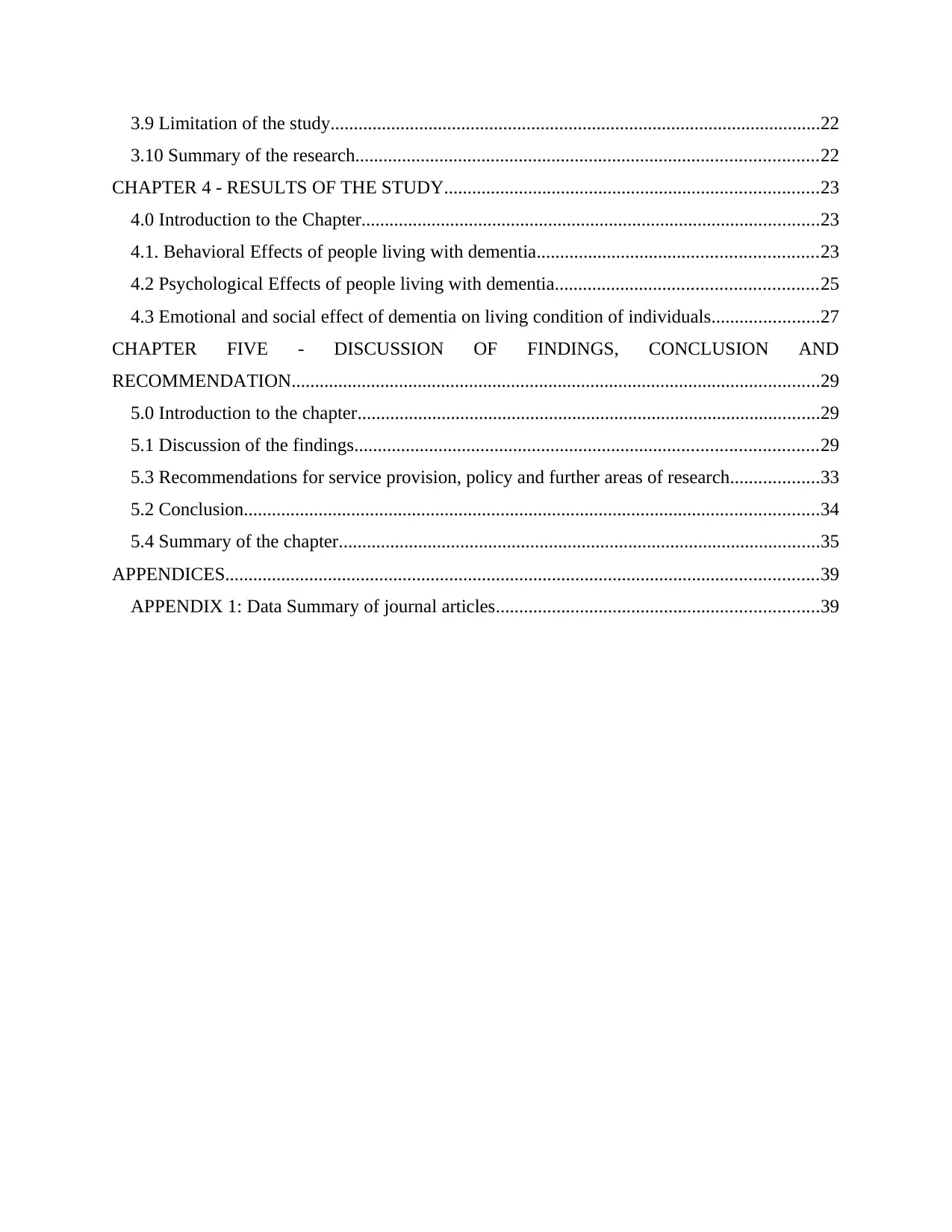
3.9 Limitation of the study.........................................................................................................22
3.10 Summary of the research...................................................................................................22
CHAPTER 4 - RESULTS OF THE STUDY................................................................................23
4.0 Introduction to the Chapter..................................................................................................23
4.1. Behavioral Effects of people living with dementia............................................................23
4.2 Psychological Effects of people living with dementia........................................................25
4.3 Emotional and social effect of dementia on living condition of individuals.......................27
CHAPTER FIVE - DISCUSSION OF FINDINGS, CONCLUSION AND
RECOMMENDATION.................................................................................................................29
5.0 Introduction to the chapter...................................................................................................29
5.1 Discussion of the findings...................................................................................................29
5.3 Recommendations for service provision, policy and further areas of research...................33
5.2 Conclusion...........................................................................................................................34
5.4 Summary of the chapter.......................................................................................................35
APPENDICES...............................................................................................................................39
APPENDIX 1: Data Summary of journal articles.....................................................................39
3.10 Summary of the research...................................................................................................22
CHAPTER 4 - RESULTS OF THE STUDY................................................................................23
4.0 Introduction to the Chapter..................................................................................................23
4.1. Behavioral Effects of people living with dementia............................................................23
4.2 Psychological Effects of people living with dementia........................................................25
4.3 Emotional and social effect of dementia on living condition of individuals.......................27
CHAPTER FIVE - DISCUSSION OF FINDINGS, CONCLUSION AND
RECOMMENDATION.................................................................................................................29
5.0 Introduction to the chapter...................................................................................................29
5.1 Discussion of the findings...................................................................................................29
5.3 Recommendations for service provision, policy and further areas of research...................33
5.2 Conclusion...........................................................................................................................34
5.4 Summary of the chapter.......................................................................................................35
APPENDICES...............................................................................................................................39
APPENDIX 1: Data Summary of journal articles.....................................................................39
⊘ This is a preview!⊘
Do you want full access?
Subscribe today to unlock all pages.

Trusted by 1+ million students worldwide
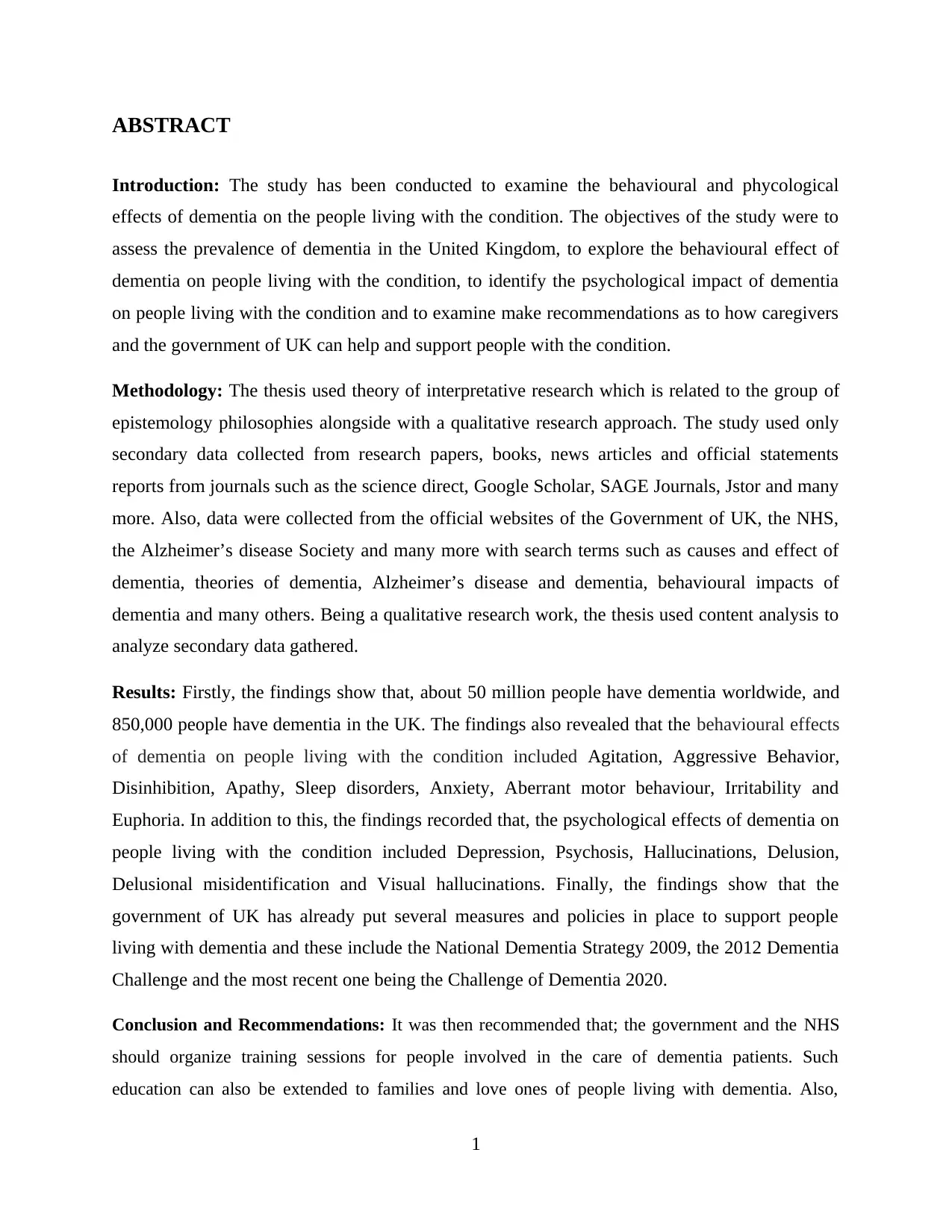
ABSTRACT
Introduction: The study has been conducted to examine the behavioural and phycological
effects of dementia on the people living with the condition. The objectives of the study were to
assess the prevalence of dementia in the United Kingdom, to explore the behavioural effect of
dementia on people living with the condition, to identify the psychological impact of dementia
on people living with the condition and to examine make recommendations as to how caregivers
and the government of UK can help and support people with the condition.
Methodology: The thesis used theory of interpretative research which is related to the group of
epistemology philosophies alongside with a qualitative research approach. The study used only
secondary data collected from research papers, books, news articles and official statements
reports from journals such as the science direct, Google Scholar, SAGE Journals, Jstor and many
more. Also, data were collected from the official websites of the Government of UK, the NHS,
the Alzheimer’s disease Society and many more with search terms such as causes and effect of
dementia, theories of dementia, Alzheimer’s disease and dementia, behavioural impacts of
dementia and many others. Being a qualitative research work, the thesis used content analysis to
analyze secondary data gathered.
Results: Firstly, the findings show that, about 50 million people have dementia worldwide, and
850,000 people have dementia in the UK. The findings also revealed that the behavioural effects
of dementia on people living with the condition included Agitation, Aggressive Behavior,
Disinhibition, Apathy, Sleep disorders, Anxiety, Aberrant motor behaviour, Irritability and
Euphoria. In addition to this, the findings recorded that, the psychological effects of dementia on
people living with the condition included Depression, Psychosis, Hallucinations, Delusion,
Delusional misidentification and Visual hallucinations. Finally, the findings show that the
government of UK has already put several measures and policies in place to support people
living with dementia and these include the National Dementia Strategy 2009, the 2012 Dementia
Challenge and the most recent one being the Challenge of Dementia 2020.
Conclusion and Recommendations: It was then recommended that; the government and the NHS
should organize training sessions for people involved in the care of dementia patients. Such
education can also be extended to families and love ones of people living with dementia. Also,
1
Introduction: The study has been conducted to examine the behavioural and phycological
effects of dementia on the people living with the condition. The objectives of the study were to
assess the prevalence of dementia in the United Kingdom, to explore the behavioural effect of
dementia on people living with the condition, to identify the psychological impact of dementia
on people living with the condition and to examine make recommendations as to how caregivers
and the government of UK can help and support people with the condition.
Methodology: The thesis used theory of interpretative research which is related to the group of
epistemology philosophies alongside with a qualitative research approach. The study used only
secondary data collected from research papers, books, news articles and official statements
reports from journals such as the science direct, Google Scholar, SAGE Journals, Jstor and many
more. Also, data were collected from the official websites of the Government of UK, the NHS,
the Alzheimer’s disease Society and many more with search terms such as causes and effect of
dementia, theories of dementia, Alzheimer’s disease and dementia, behavioural impacts of
dementia and many others. Being a qualitative research work, the thesis used content analysis to
analyze secondary data gathered.
Results: Firstly, the findings show that, about 50 million people have dementia worldwide, and
850,000 people have dementia in the UK. The findings also revealed that the behavioural effects
of dementia on people living with the condition included Agitation, Aggressive Behavior,
Disinhibition, Apathy, Sleep disorders, Anxiety, Aberrant motor behaviour, Irritability and
Euphoria. In addition to this, the findings recorded that, the psychological effects of dementia on
people living with the condition included Depression, Psychosis, Hallucinations, Delusion,
Delusional misidentification and Visual hallucinations. Finally, the findings show that the
government of UK has already put several measures and policies in place to support people
living with dementia and these include the National Dementia Strategy 2009, the 2012 Dementia
Challenge and the most recent one being the Challenge of Dementia 2020.
Conclusion and Recommendations: It was then recommended that; the government and the NHS
should organize training sessions for people involved in the care of dementia patients. Such
education can also be extended to families and love ones of people living with dementia. Also,
1
Paraphrase This Document
Need a fresh take? Get an instant paraphrase of this document with our AI Paraphraser

caregivers and health practitioners caring for people living with dementia should try to involve
people living with dementia in decisions about their care. Caregiver and medical practitioners should
encourage and enable people living with dementia share their views and opinions about their health
care. Also, the researcher recommended that the government of UK and the NHS should organize
awareness and sensitization programs to impact the knowledge of the risk factors and what can be
done by younger people to avoid developing dementia. Last but not least, the general public should
also be sensitized and educated in order not to engage in any form of stigmatization for people living
with dementia. The general public needs to be educated and oriented to be more supportive of people
living with dementia.
2
people living with dementia in decisions about their care. Caregiver and medical practitioners should
encourage and enable people living with dementia share their views and opinions about their health
care. Also, the researcher recommended that the government of UK and the NHS should organize
awareness and sensitization programs to impact the knowledge of the risk factors and what can be
done by younger people to avoid developing dementia. Last but not least, the general public should
also be sensitized and educated in order not to engage in any form of stigmatization for people living
with dementia. The general public needs to be educated and oriented to be more supportive of people
living with dementia.
2
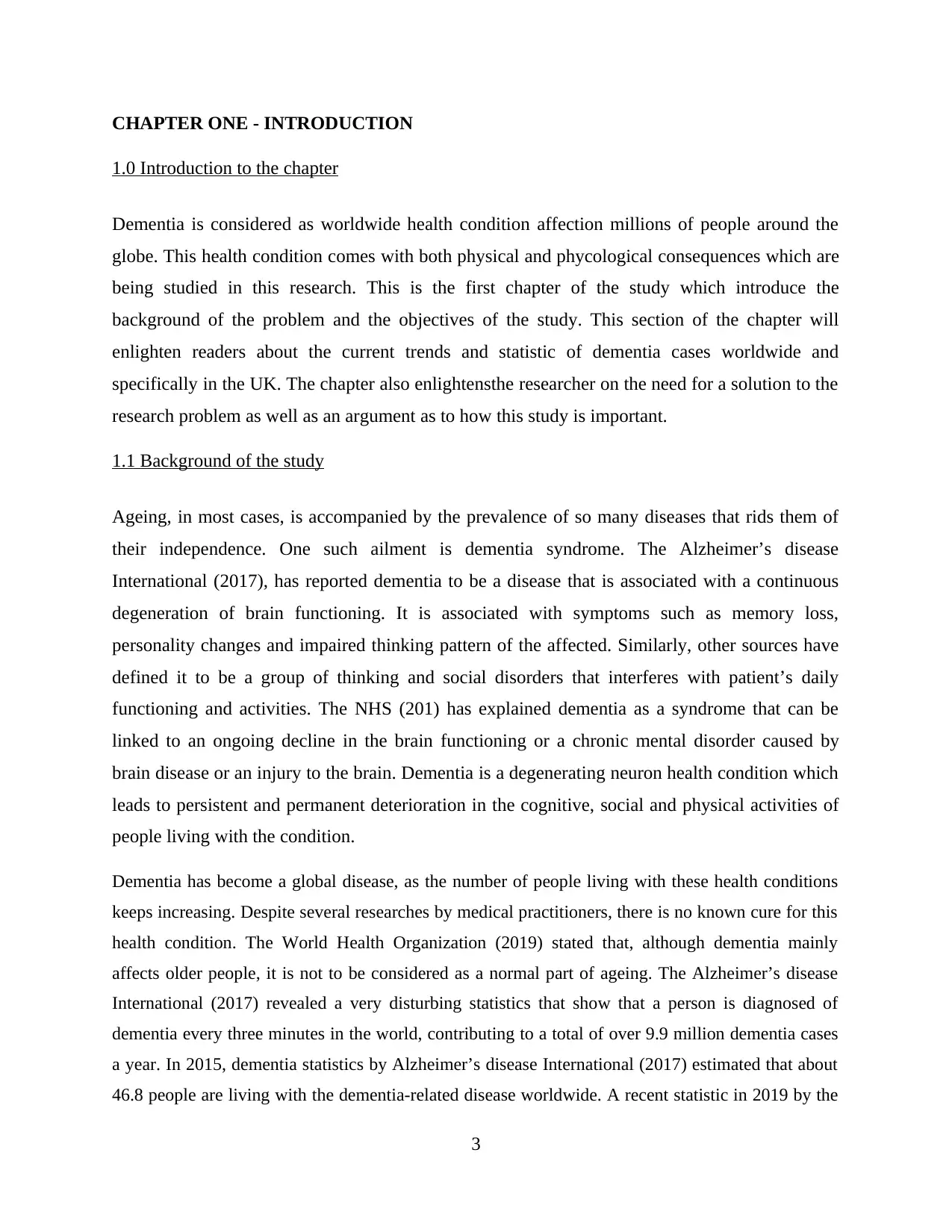
CHAPTER ONE - INTRODUCTION
1.0 Introduction to the chapter
Dementia is considered as worldwide health condition affection millions of people around the
globe. This health condition comes with both physical and phycological consequences which are
being studied in this research. This is the first chapter of the study which introduce the
background of the problem and the objectives of the study. This section of the chapter will
enlighten readers about the current trends and statistic of dementia cases worldwide and
specifically in the UK. The chapter also enlightensthe researcher on the need for a solution to the
research problem as well as an argument as to how this study is important.
1.1 Background of the study
Ageing, in most cases, is accompanied by the prevalence of so many diseases that rids them of
their independence. One such ailment is dementia syndrome. The Alzheimer’s disease
International (2017), has reported dementia to be a disease that is associated with a continuous
degeneration of brain functioning. It is associated with symptoms such as memory loss,
personality changes and impaired thinking pattern of the affected. Similarly, other sources have
defined it to be a group of thinking and social disorders that interferes with patient’s daily
functioning and activities. The NHS (201) has explained dementia as a syndrome that can be
linked to an ongoing decline in the brain functioning or a chronic mental disorder caused by
brain disease or an injury to the brain. Dementia is a degenerating neuron health condition which
leads to persistent and permanent deterioration in the cognitive, social and physical activities of
people living with the condition.
Dementia has become a global disease, as the number of people living with these health conditions
keeps increasing. Despite several researches by medical practitioners, there is no known cure for this
health condition. The World Health Organization (2019) stated that, although dementia mainly
affects older people, it is not to be considered as a normal part of ageing. The Alzheimer’s disease
International (2017) revealed a very disturbing statistics that show that a person is diagnosed of
dementia every three minutes in the world, contributing to a total of over 9.9 million dementia cases
a year. In 2015, dementia statistics by Alzheimer’s disease International (2017) estimated that about
46.8 people are living with the dementia-related disease worldwide. A recent statistic in 2019 by the
3
1.0 Introduction to the chapter
Dementia is considered as worldwide health condition affection millions of people around the
globe. This health condition comes with both physical and phycological consequences which are
being studied in this research. This is the first chapter of the study which introduce the
background of the problem and the objectives of the study. This section of the chapter will
enlighten readers about the current trends and statistic of dementia cases worldwide and
specifically in the UK. The chapter also enlightensthe researcher on the need for a solution to the
research problem as well as an argument as to how this study is important.
1.1 Background of the study
Ageing, in most cases, is accompanied by the prevalence of so many diseases that rids them of
their independence. One such ailment is dementia syndrome. The Alzheimer’s disease
International (2017), has reported dementia to be a disease that is associated with a continuous
degeneration of brain functioning. It is associated with symptoms such as memory loss,
personality changes and impaired thinking pattern of the affected. Similarly, other sources have
defined it to be a group of thinking and social disorders that interferes with patient’s daily
functioning and activities. The NHS (201) has explained dementia as a syndrome that can be
linked to an ongoing decline in the brain functioning or a chronic mental disorder caused by
brain disease or an injury to the brain. Dementia is a degenerating neuron health condition which
leads to persistent and permanent deterioration in the cognitive, social and physical activities of
people living with the condition.
Dementia has become a global disease, as the number of people living with these health conditions
keeps increasing. Despite several researches by medical practitioners, there is no known cure for this
health condition. The World Health Organization (2019) stated that, although dementia mainly
affects older people, it is not to be considered as a normal part of ageing. The Alzheimer’s disease
International (2017) revealed a very disturbing statistics that show that a person is diagnosed of
dementia every three minutes in the world, contributing to a total of over 9.9 million dementia cases
a year. In 2015, dementia statistics by Alzheimer’s disease International (2017) estimated that about
46.8 people are living with the dementia-related disease worldwide. A recent statistic in 2019 by the
3
⊘ This is a preview!⊘
Do you want full access?
Subscribe today to unlock all pages.

Trusted by 1+ million students worldwide
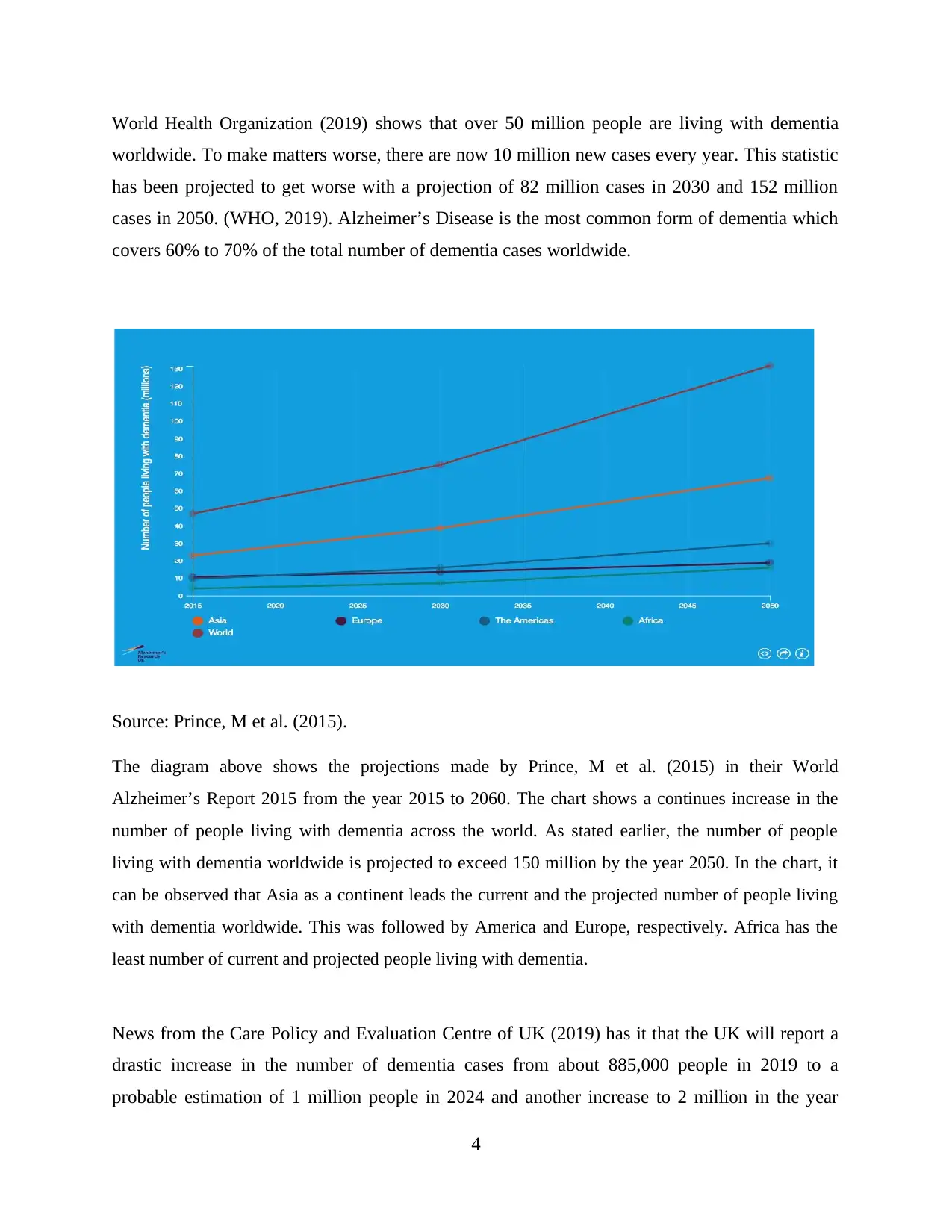
World Health Organization (2019) shows that over 50 million people are living with dementia
worldwide. To make matters worse, there are now 10 million new cases every year. This statistic
has been projected to get worse with a projection of 82 million cases in 2030 and 152 million
cases in 2050. (WHO, 2019). Alzheimer’s Disease is the most common form of dementia which
covers 60% to 70% of the total number of dementia cases worldwide.
Source: Prince, M et al. (2015).
The diagram above shows the projections made by Prince, M et al. (2015) in their World
Alzheimer’s Report 2015 from the year 2015 to 2060. The chart shows a continues increase in the
number of people living with dementia across the world. As stated earlier, the number of people
living with dementia worldwide is projected to exceed 150 million by the year 2050. In the chart, it
can be observed that Asia as a continent leads the current and the projected number of people living
with dementia worldwide. This was followed by America and Europe, respectively. Africa has the
least number of current and projected people living with dementia.
News from the Care Policy and Evaluation Centre of UK (2019) has it that the UK will report a
drastic increase in the number of dementia cases from about 885,000 people in 2019 to a
probable estimation of 1 million people in 2024 and another increase to 2 million in the year
4
worldwide. To make matters worse, there are now 10 million new cases every year. This statistic
has been projected to get worse with a projection of 82 million cases in 2030 and 152 million
cases in 2050. (WHO, 2019). Alzheimer’s Disease is the most common form of dementia which
covers 60% to 70% of the total number of dementia cases worldwide.
Source: Prince, M et al. (2015).
The diagram above shows the projections made by Prince, M et al. (2015) in their World
Alzheimer’s Report 2015 from the year 2015 to 2060. The chart shows a continues increase in the
number of people living with dementia across the world. As stated earlier, the number of people
living with dementia worldwide is projected to exceed 150 million by the year 2050. In the chart, it
can be observed that Asia as a continent leads the current and the projected number of people living
with dementia worldwide. This was followed by America and Europe, respectively. Africa has the
least number of current and projected people living with dementia.
News from the Care Policy and Evaluation Centre of UK (2019) has it that the UK will report a
drastic increase in the number of dementia cases from about 885,000 people in 2019 to a
probable estimation of 1 million people in 2024 and another increase to 2 million in the year
4
Paraphrase This Document
Need a fresh take? Get an instant paraphrase of this document with our AI Paraphraser
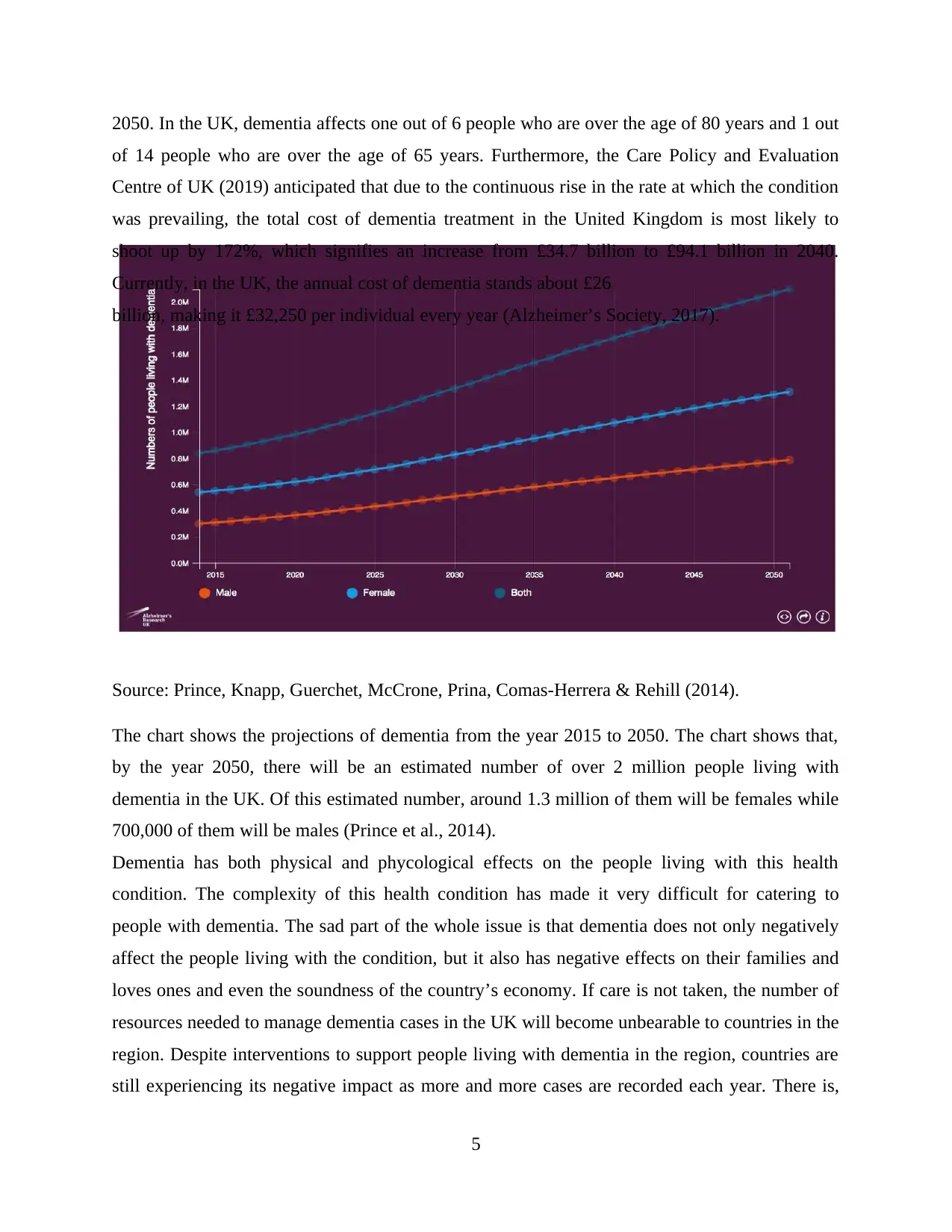
2050. In the UK, dementia affects one out of 6 people who are over the age of 80 years and 1 out
of 14 people who are over the age of 65 years. Furthermore, the Care Policy and Evaluation
Centre of UK (2019) anticipated that due to the continuous rise in the rate at which the condition
was prevailing, the total cost of dementia treatment in the United Kingdom is most likely to
shoot up by 172%, which signifies an increase from £34.7 billion to £94.1 billion in 2040.
Currently, in the UK, the annual cost of dementia stands about £26
billion, making it £32,250 per individual every year (Alzheimer’s Society, 2017).
Source: Prince, Knapp, Guerchet, McCrone, Prina, Comas-Herrera & Rehill (2014).
The chart shows the projections of dementia from the year 2015 to 2050. The chart shows that,
by the year 2050, there will be an estimated number of over 2 million people living with
dementia in the UK. Of this estimated number, around 1.3 million of them will be females while
700,000 of them will be males (Prince et al., 2014).
Dementia has both physical and phycological effects on the people living with this health
condition. The complexity of this health condition has made it very difficult for catering to
people with dementia. The sad part of the whole issue is that dementia does not only negatively
affect the people living with the condition, but it also has negative effects on their families and
loves ones and even the soundness of the country’s economy. If care is not taken, the number of
resources needed to manage dementia cases in the UK will become unbearable to countries in the
region. Despite interventions to support people living with dementia in the region, countries are
still experiencing its negative impact as more and more cases are recorded each year. There is,
5
of 14 people who are over the age of 65 years. Furthermore, the Care Policy and Evaluation
Centre of UK (2019) anticipated that due to the continuous rise in the rate at which the condition
was prevailing, the total cost of dementia treatment in the United Kingdom is most likely to
shoot up by 172%, which signifies an increase from £34.7 billion to £94.1 billion in 2040.
Currently, in the UK, the annual cost of dementia stands about £26
billion, making it £32,250 per individual every year (Alzheimer’s Society, 2017).
Source: Prince, Knapp, Guerchet, McCrone, Prina, Comas-Herrera & Rehill (2014).
The chart shows the projections of dementia from the year 2015 to 2050. The chart shows that,
by the year 2050, there will be an estimated number of over 2 million people living with
dementia in the UK. Of this estimated number, around 1.3 million of them will be females while
700,000 of them will be males (Prince et al., 2014).
Dementia has both physical and phycological effects on the people living with this health
condition. The complexity of this health condition has made it very difficult for catering to
people with dementia. The sad part of the whole issue is that dementia does not only negatively
affect the people living with the condition, but it also has negative effects on their families and
loves ones and even the soundness of the country’s economy. If care is not taken, the number of
resources needed to manage dementia cases in the UK will become unbearable to countries in the
region. Despite interventions to support people living with dementia in the region, countries are
still experiencing its negative impact as more and more cases are recorded each year. There is,
5
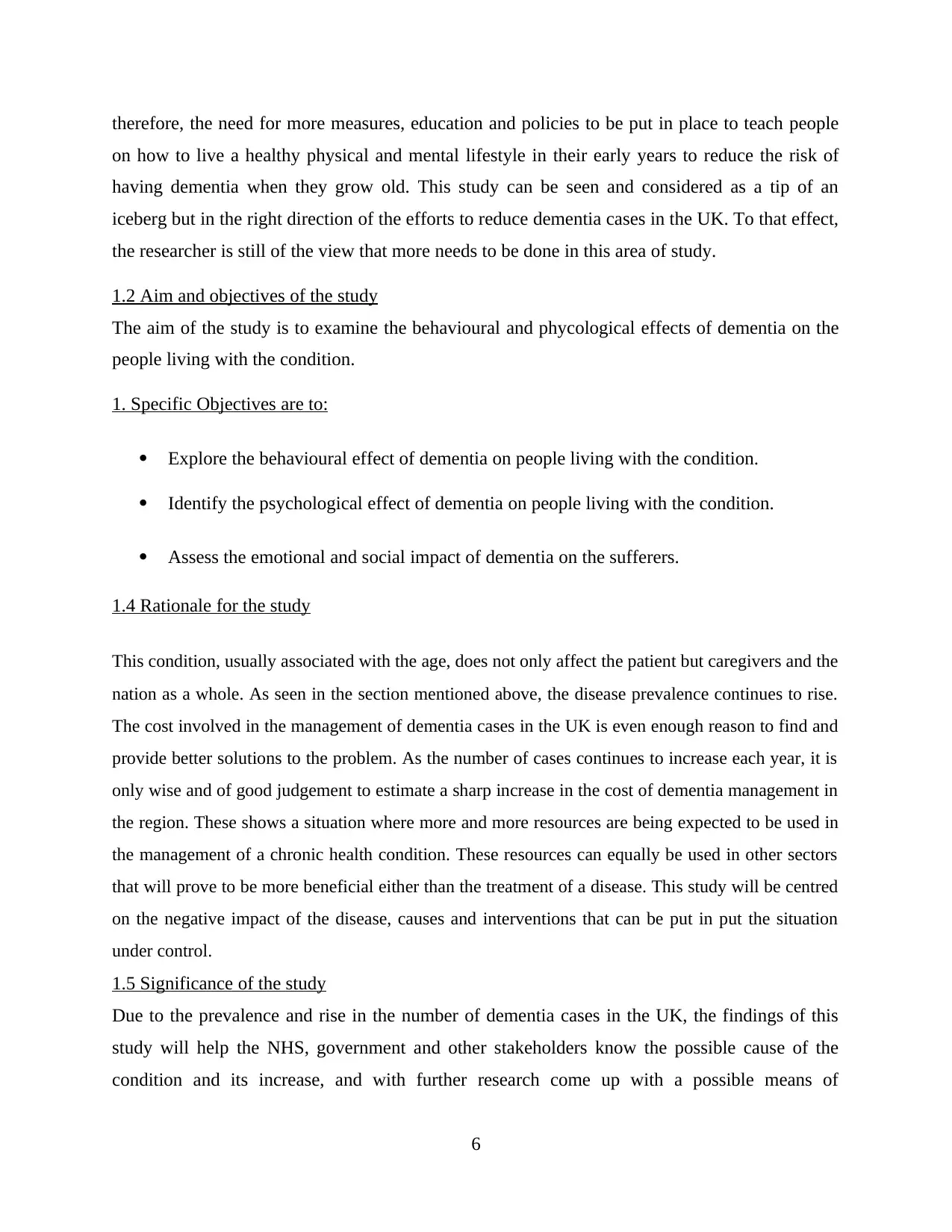
therefore, the need for more measures, education and policies to be put in place to teach people
on how to live a healthy physical and mental lifestyle in their early years to reduce the risk of
having dementia when they grow old. This study can be seen and considered as a tip of an
iceberg but in the right direction of the efforts to reduce dementia cases in the UK. To that effect,
the researcher is still of the view that more needs to be done in this area of study.
1.2 Aim and objectives of the study
The aim of the study is to examine the behavioural and phycological effects of dementia on the
people living with the condition.
1. Specific Objectives are to:
Explore the behavioural effect of dementia on people living with the condition.
Identify the psychological effect of dementia on people living with the condition.
Assess the emotional and social impact of dementia on the sufferers.
1.4 Rationale for the study
This condition, usually associated with the age, does not only affect the patient but caregivers and the
nation as a whole. As seen in the section mentioned above, the disease prevalence continues to rise.
The cost involved in the management of dementia cases in the UK is even enough reason to find and
provide better solutions to the problem. As the number of cases continues to increase each year, it is
only wise and of good judgement to estimate a sharp increase in the cost of dementia management in
the region. These shows a situation where more and more resources are being expected to be used in
the management of a chronic health condition. These resources can equally be used in other sectors
that will prove to be more beneficial either than the treatment of a disease. This study will be centred
on the negative impact of the disease, causes and interventions that can be put in put the situation
under control.
1.5 Significance of the study
Due to the prevalence and rise in the number of dementia cases in the UK, the findings of this
study will help the NHS, government and other stakeholders know the possible cause of the
condition and its increase, and with further research come up with a possible means of
6
on how to live a healthy physical and mental lifestyle in their early years to reduce the risk of
having dementia when they grow old. This study can be seen and considered as a tip of an
iceberg but in the right direction of the efforts to reduce dementia cases in the UK. To that effect,
the researcher is still of the view that more needs to be done in this area of study.
1.2 Aim and objectives of the study
The aim of the study is to examine the behavioural and phycological effects of dementia on the
people living with the condition.
1. Specific Objectives are to:
Explore the behavioural effect of dementia on people living with the condition.
Identify the psychological effect of dementia on people living with the condition.
Assess the emotional and social impact of dementia on the sufferers.
1.4 Rationale for the study
This condition, usually associated with the age, does not only affect the patient but caregivers and the
nation as a whole. As seen in the section mentioned above, the disease prevalence continues to rise.
The cost involved in the management of dementia cases in the UK is even enough reason to find and
provide better solutions to the problem. As the number of cases continues to increase each year, it is
only wise and of good judgement to estimate a sharp increase in the cost of dementia management in
the region. These shows a situation where more and more resources are being expected to be used in
the management of a chronic health condition. These resources can equally be used in other sectors
that will prove to be more beneficial either than the treatment of a disease. This study will be centred
on the negative impact of the disease, causes and interventions that can be put in put the situation
under control.
1.5 Significance of the study
Due to the prevalence and rise in the number of dementia cases in the UK, the findings of this
study will help the NHS, government and other stakeholders know the possible cause of the
condition and its increase, and with further research come up with a possible means of
6
⊘ This is a preview!⊘
Do you want full access?
Subscribe today to unlock all pages.

Trusted by 1+ million students worldwide
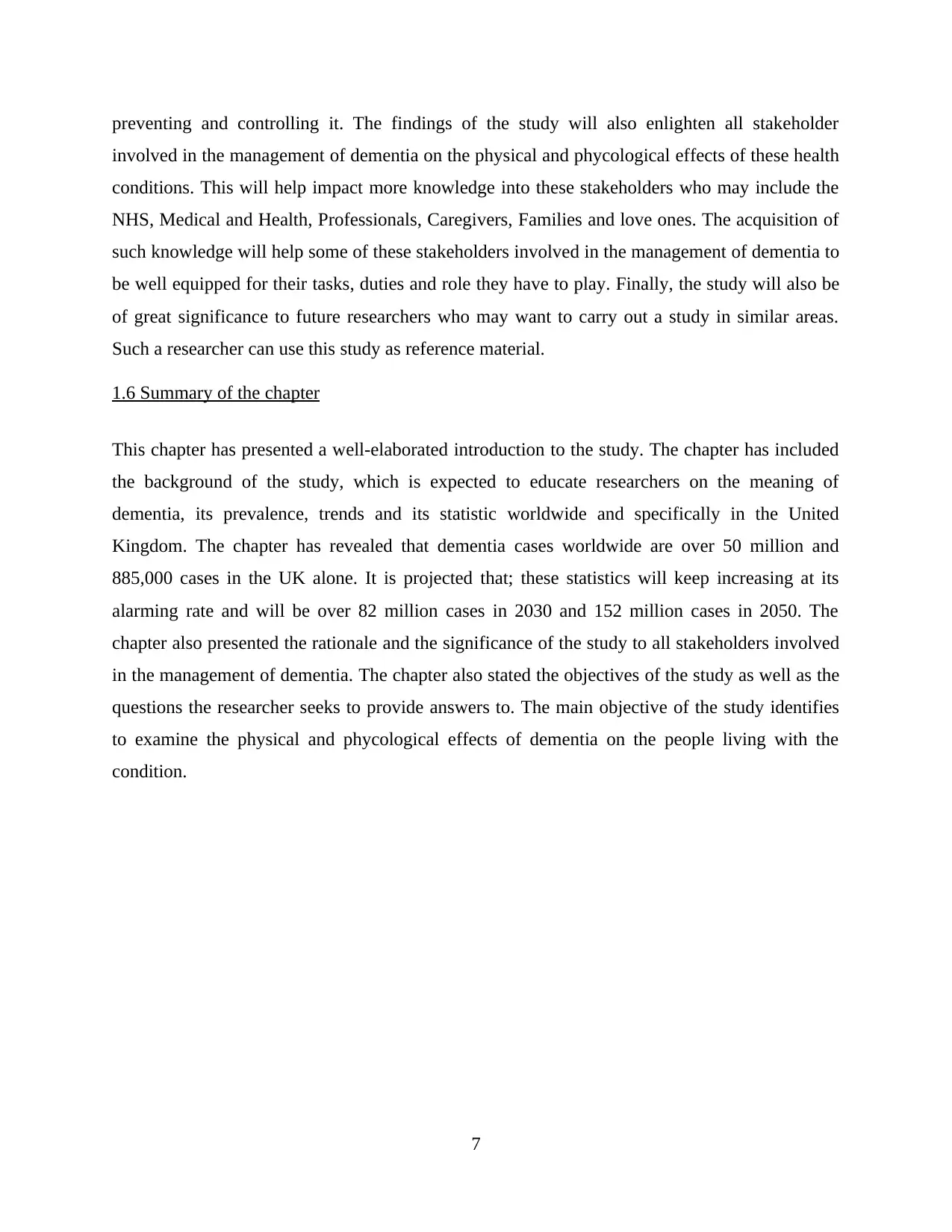
preventing and controlling it. The findings of the study will also enlighten all stakeholder
involved in the management of dementia on the physical and phycological effects of these health
conditions. This will help impact more knowledge into these stakeholders who may include the
NHS, Medical and Health, Professionals, Caregivers, Families and love ones. The acquisition of
such knowledge will help some of these stakeholders involved in the management of dementia to
be well equipped for their tasks, duties and role they have to play. Finally, the study will also be
of great significance to future researchers who may want to carry out a study in similar areas.
Such a researcher can use this study as reference material.
1.6 Summary of the chapter
This chapter has presented a well-elaborated introduction to the study. The chapter has included
the background of the study, which is expected to educate researchers on the meaning of
dementia, its prevalence, trends and its statistic worldwide and specifically in the United
Kingdom. The chapter has revealed that dementia cases worldwide are over 50 million and
885,000 cases in the UK alone. It is projected that; these statistics will keep increasing at its
alarming rate and will be over 82 million cases in 2030 and 152 million cases in 2050. The
chapter also presented the rationale and the significance of the study to all stakeholders involved
in the management of dementia. The chapter also stated the objectives of the study as well as the
questions the researcher seeks to provide answers to. The main objective of the study identifies
to examine the physical and phycological effects of dementia on the people living with the
condition.
7
involved in the management of dementia on the physical and phycological effects of these health
conditions. This will help impact more knowledge into these stakeholders who may include the
NHS, Medical and Health, Professionals, Caregivers, Families and love ones. The acquisition of
such knowledge will help some of these stakeholders involved in the management of dementia to
be well equipped for their tasks, duties and role they have to play. Finally, the study will also be
of great significance to future researchers who may want to carry out a study in similar areas.
Such a researcher can use this study as reference material.
1.6 Summary of the chapter
This chapter has presented a well-elaborated introduction to the study. The chapter has included
the background of the study, which is expected to educate researchers on the meaning of
dementia, its prevalence, trends and its statistic worldwide and specifically in the United
Kingdom. The chapter has revealed that dementia cases worldwide are over 50 million and
885,000 cases in the UK alone. It is projected that; these statistics will keep increasing at its
alarming rate and will be over 82 million cases in 2030 and 152 million cases in 2050. The
chapter also presented the rationale and the significance of the study to all stakeholders involved
in the management of dementia. The chapter also stated the objectives of the study as well as the
questions the researcher seeks to provide answers to. The main objective of the study identifies
to examine the physical and phycological effects of dementia on the people living with the
condition.
7
Paraphrase This Document
Need a fresh take? Get an instant paraphrase of this document with our AI Paraphraser
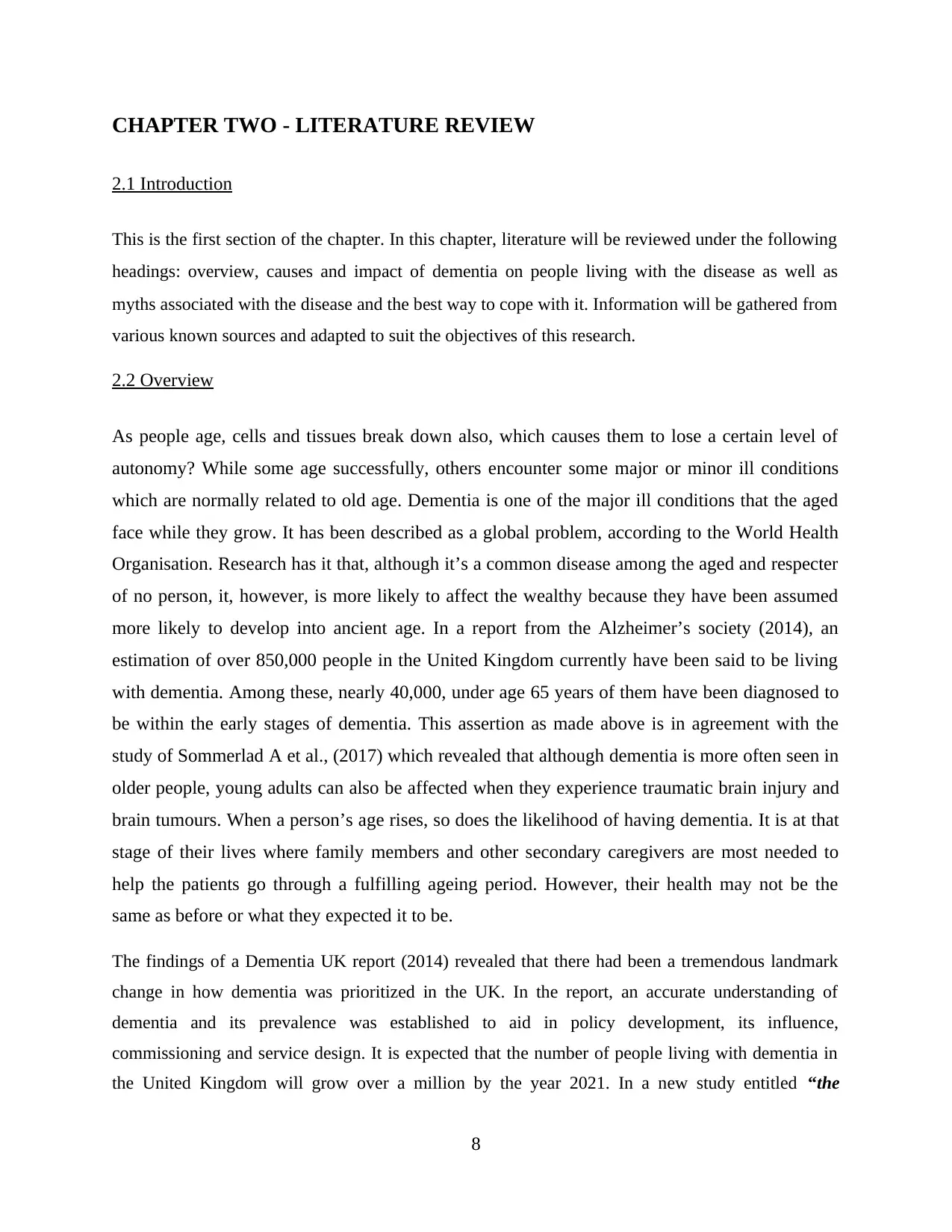
CHAPTER TWO - LITERATURE REVIEW
2.1 Introduction
This is the first section of the chapter. In this chapter, literature will be reviewed under the following
headings: overview, causes and impact of dementia on people living with the disease as well as
myths associated with the disease and the best way to cope with it. Information will be gathered from
various known sources and adapted to suit the objectives of this research.
2.2 Overview
As people age, cells and tissues break down also, which causes them to lose a certain level of
autonomy? While some age successfully, others encounter some major or minor ill conditions
which are normally related to old age. Dementia is one of the major ill conditions that the aged
face while they grow. It has been described as a global problem, according to the World Health
Organisation. Research has it that, although it’s a common disease among the aged and respecter
of no person, it, however, is more likely to affect the wealthy because they have been assumed
more likely to develop into ancient age. In a report from the Alzheimer’s society (2014), an
estimation of over 850,000 people in the United Kingdom currently have been said to be living
with dementia. Among these, nearly 40,000, under age 65 years of them have been diagnosed to
be within the early stages of dementia. This assertion as made above is in agreement with the
study of Sommerlad A et al., (2017) which revealed that although dementia is more often seen in
older people, young adults can also be affected when they experience traumatic brain injury and
brain tumours. When a person’s age rises, so does the likelihood of having dementia. It is at that
stage of their lives where family members and other secondary caregivers are most needed to
help the patients go through a fulfilling ageing period. However, their health may not be the
same as before or what they expected it to be.
The findings of a Dementia UK report (2014) revealed that there had been a tremendous landmark
change in how dementia was prioritized in the UK. In the report, an accurate understanding of
dementia and its prevalence was established to aid in policy development, its influence,
commissioning and service design. It is expected that the number of people living with dementia in
the United Kingdom will grow over a million by the year 2021. In a new study entitled “the
8
2.1 Introduction
This is the first section of the chapter. In this chapter, literature will be reviewed under the following
headings: overview, causes and impact of dementia on people living with the disease as well as
myths associated with the disease and the best way to cope with it. Information will be gathered from
various known sources and adapted to suit the objectives of this research.
2.2 Overview
As people age, cells and tissues break down also, which causes them to lose a certain level of
autonomy? While some age successfully, others encounter some major or minor ill conditions
which are normally related to old age. Dementia is one of the major ill conditions that the aged
face while they grow. It has been described as a global problem, according to the World Health
Organisation. Research has it that, although it’s a common disease among the aged and respecter
of no person, it, however, is more likely to affect the wealthy because they have been assumed
more likely to develop into ancient age. In a report from the Alzheimer’s society (2014), an
estimation of over 850,000 people in the United Kingdom currently have been said to be living
with dementia. Among these, nearly 40,000, under age 65 years of them have been diagnosed to
be within the early stages of dementia. This assertion as made above is in agreement with the
study of Sommerlad A et al., (2017) which revealed that although dementia is more often seen in
older people, young adults can also be affected when they experience traumatic brain injury and
brain tumours. When a person’s age rises, so does the likelihood of having dementia. It is at that
stage of their lives where family members and other secondary caregivers are most needed to
help the patients go through a fulfilling ageing period. However, their health may not be the
same as before or what they expected it to be.
The findings of a Dementia UK report (2014) revealed that there had been a tremendous landmark
change in how dementia was prioritized in the UK. In the report, an accurate understanding of
dementia and its prevalence was established to aid in policy development, its influence,
commissioning and service design. It is expected that the number of people living with dementia in
the United Kingdom will grow over a million by the year 2021. In a new study entitled “the
8
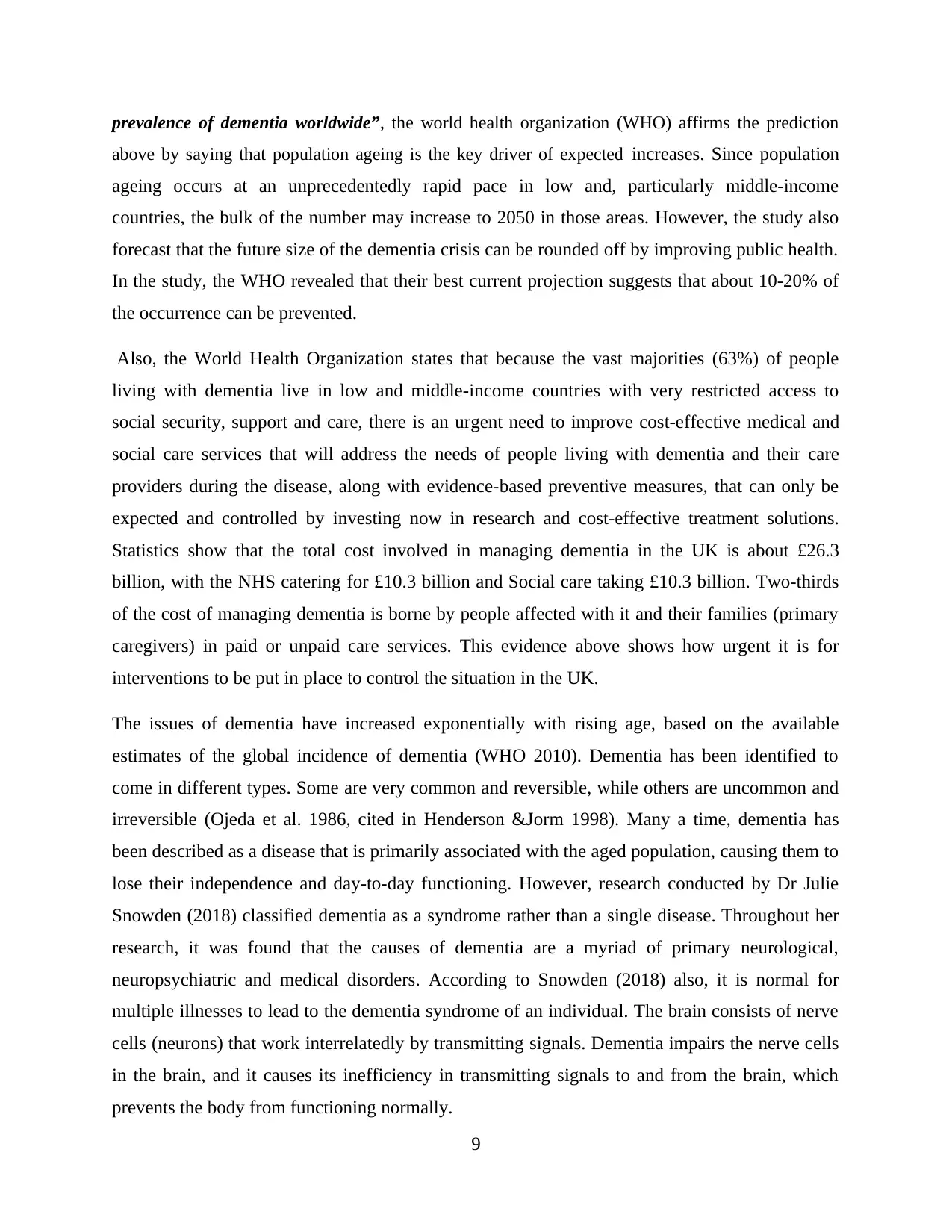
prevalence of dementia worldwide”, the world health organization (WHO) affirms the prediction
above by saying that population ageing is the key driver of expected increases. Since population
ageing occurs at an unprecedentedly rapid pace in low and, particularly middle-income
countries, the bulk of the number may increase to 2050 in those areas. However, the study also
forecast that the future size of the dementia crisis can be rounded off by improving public health.
In the study, the WHO revealed that their best current projection suggests that about 10-20% of
the occurrence can be prevented.
Also, the World Health Organization states that because the vast majorities (63%) of people
living with dementia live in low and middle-income countries with very restricted access to
social security, support and care, there is an urgent need to improve cost-effective medical and
social care services that will address the needs of people living with dementia and their care
providers during the disease, along with evidence-based preventive measures, that can only be
expected and controlled by investing now in research and cost-effective treatment solutions.
Statistics show that the total cost involved in managing dementia in the UK is about £26.3
billion, with the NHS catering for £10.3 billion and Social care taking £10.3 billion. Two-thirds
of the cost of managing dementia is borne by people affected with it and their families (primary
caregivers) in paid or unpaid care services. This evidence above shows how urgent it is for
interventions to be put in place to control the situation in the UK.
The issues of dementia have increased exponentially with rising age, based on the available
estimates of the global incidence of dementia (WHO 2010). Dementia has been identified to
come in different types. Some are very common and reversible, while others are uncommon and
irreversible (Ojeda et al. 1986, cited in Henderson &Jorm 1998). Many a time, dementia has
been described as a disease that is primarily associated with the aged population, causing them to
lose their independence and day-to-day functioning. However, research conducted by Dr Julie
Snowden (2018) classified dementia as a syndrome rather than a single disease. Throughout her
research, it was found that the causes of dementia are a myriad of primary neurological,
neuropsychiatric and medical disorders. According to Snowden (2018) also, it is normal for
multiple illnesses to lead to the dementia syndrome of an individual. The brain consists of nerve
cells (neurons) that work interrelatedly by transmitting signals. Dementia impairs the nerve cells
in the brain, and it causes its inefficiency in transmitting signals to and from the brain, which
prevents the body from functioning normally.
9
above by saying that population ageing is the key driver of expected increases. Since population
ageing occurs at an unprecedentedly rapid pace in low and, particularly middle-income
countries, the bulk of the number may increase to 2050 in those areas. However, the study also
forecast that the future size of the dementia crisis can be rounded off by improving public health.
In the study, the WHO revealed that their best current projection suggests that about 10-20% of
the occurrence can be prevented.
Also, the World Health Organization states that because the vast majorities (63%) of people
living with dementia live in low and middle-income countries with very restricted access to
social security, support and care, there is an urgent need to improve cost-effective medical and
social care services that will address the needs of people living with dementia and their care
providers during the disease, along with evidence-based preventive measures, that can only be
expected and controlled by investing now in research and cost-effective treatment solutions.
Statistics show that the total cost involved in managing dementia in the UK is about £26.3
billion, with the NHS catering for £10.3 billion and Social care taking £10.3 billion. Two-thirds
of the cost of managing dementia is borne by people affected with it and their families (primary
caregivers) in paid or unpaid care services. This evidence above shows how urgent it is for
interventions to be put in place to control the situation in the UK.
The issues of dementia have increased exponentially with rising age, based on the available
estimates of the global incidence of dementia (WHO 2010). Dementia has been identified to
come in different types. Some are very common and reversible, while others are uncommon and
irreversible (Ojeda et al. 1986, cited in Henderson &Jorm 1998). Many a time, dementia has
been described as a disease that is primarily associated with the aged population, causing them to
lose their independence and day-to-day functioning. However, research conducted by Dr Julie
Snowden (2018) classified dementia as a syndrome rather than a single disease. Throughout her
research, it was found that the causes of dementia are a myriad of primary neurological,
neuropsychiatric and medical disorders. According to Snowden (2018) also, it is normal for
multiple illnesses to lead to the dementia syndrome of an individual. The brain consists of nerve
cells (neurons) that work interrelatedly by transmitting signals. Dementia impairs the nerve cells
in the brain, and it causes its inefficiency in transmitting signals to and from the brain, which
prevents the body from functioning normally.
9
⊘ This is a preview!⊘
Do you want full access?
Subscribe today to unlock all pages.

Trusted by 1+ million students worldwide
1 out of 44
Related Documents
Your All-in-One AI-Powered Toolkit for Academic Success.
+13062052269
info@desklib.com
Available 24*7 on WhatsApp / Email
![[object Object]](/_next/static/media/star-bottom.7253800d.svg)
Unlock your academic potential
Copyright © 2020–2026 A2Z Services. All Rights Reserved. Developed and managed by ZUCOL.




